|
This section contains 1,930 words (approx. 7 pages at 300 words per page) |

|
Machiavelli and the Roman Empire
Summary: Explains how the Roman Republic could act as a central example for both The Prince and the Discourses on Livy. Also explains why Machiavelli finds it so worthy of imitation.
Machiavelli argued, as Hegel would later, that one must look to history and the accounts of previous nations' events in order to "sense...that flavor that they have in themselves" in common with those from the past (Discourses 6). This seems to follow the adage that those who do not learn from history are doomed to repeat it, yet for Machiavelli he seems more concerned with actually emulating history in order to repeat success than looking out for particular things to avoid. For this reason, he pulls examples from an eclectic range of histories in order to demonstrate how his principles in both The Prince and the Discourses on Livy, when followed, will lead to a successful state. In particular, he refers to the Roman Republic a great deal in the Discourses, which are focused around Livy's account of Rome's history, to demonstrate what about this ancient society was...
|
This section contains 1,930 words (approx. 7 pages at 300 words per page) |

|


